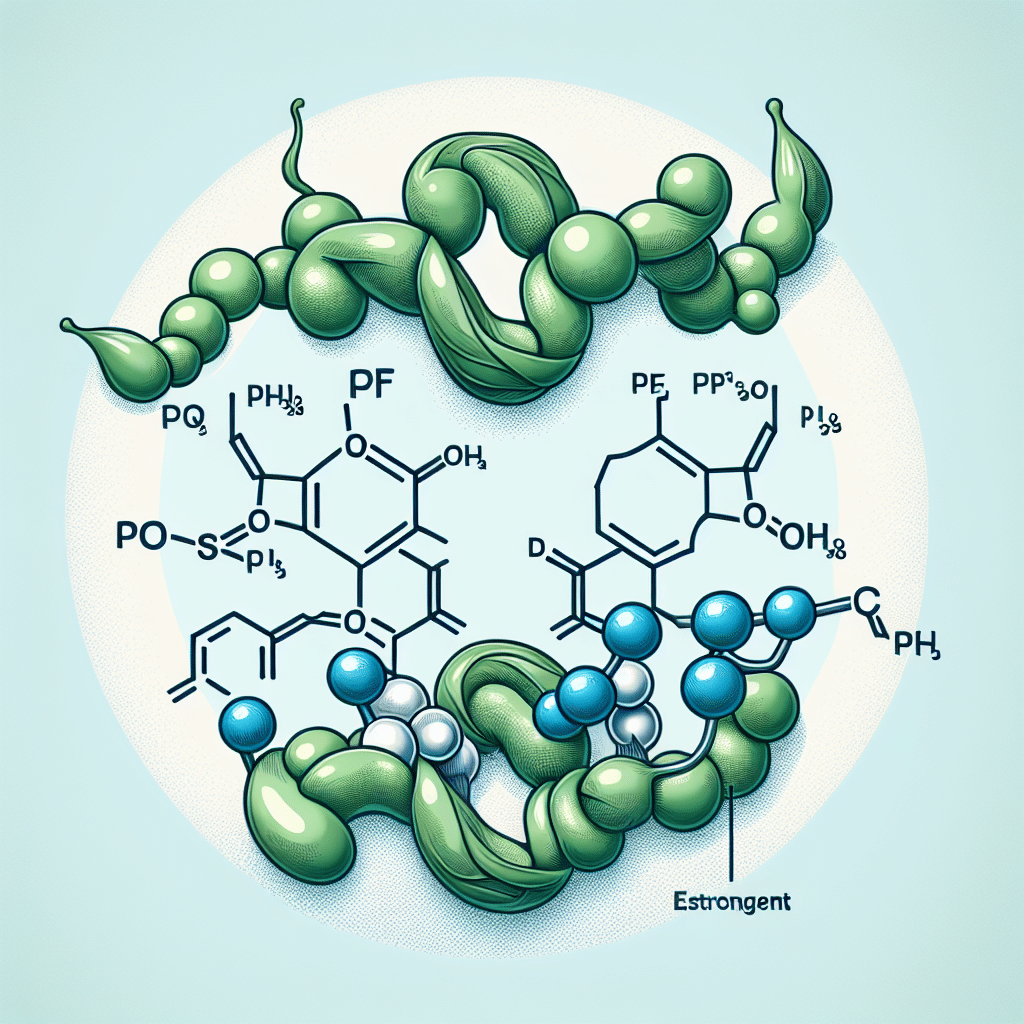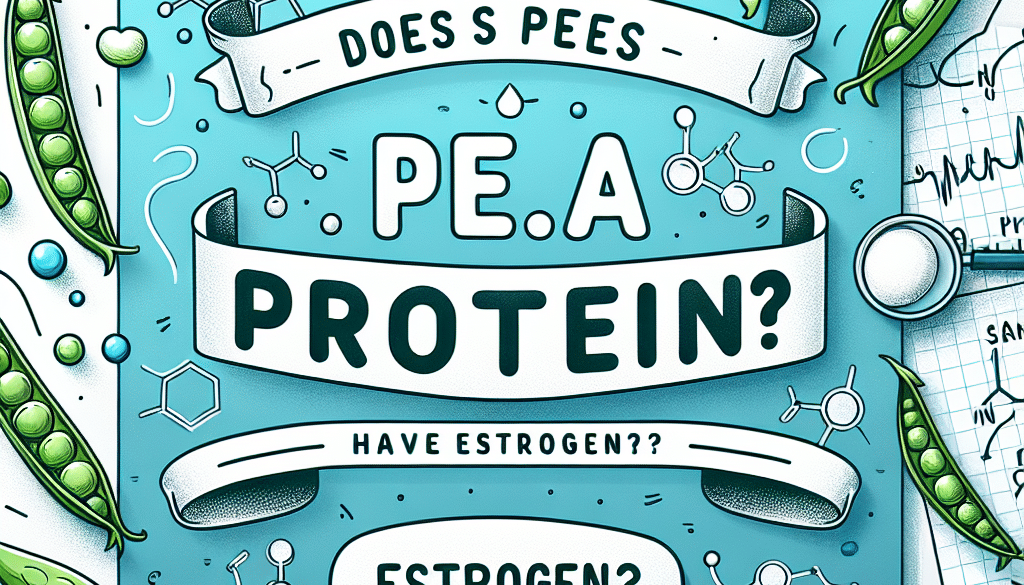Does Pea Protein Have Estrogen?
-
Table of Contents
- Pea Protein and Estrogen: Unraveling the Myths and Facts
- Understanding Pea Protein
- Estrogen: A Hormonal Overview
- Does Pea Protein Contain Estrogen?
- Phytoestrogens and Pea Protein
- Research on Pea Protein and Hormonal Effects
- Health Benefits of Pea Protein
- Case Studies and Examples
- Conclusion: Pea Protein as a Safe Protein Source
- Discover ETprotein’s High-Quality Pea Protein Products
Pea Protein and Estrogen: Unraveling the Myths and Facts

Pea protein has become a popular plant-based alternative to animal-derived proteins, especially among vegetarians, vegans, and those with dietary restrictions. As its popularity grows, so does the curiosity about its nutritional profile and potential hormonal effects. One question that often arises is whether pea protein contains estrogen, a hormone that plays a crucial role in the human body but can also be a concern when present in high amounts. This article delves into the science behind pea protein and its relationship with estrogen, providing a comprehensive analysis for health-conscious consumers.
Understanding Pea Protein
Before we explore the connection between pea protein and estrogen, it’s essential to understand what pea protein is and how it’s derived. Pea protein is extracted from yellow split peas and is a high-quality source of protein that contains all nine essential amino acids. It’s commonly used in protein powders, meat substitutes, and a variety of health food products.
Estrogen: A Hormonal Overview
Estrogen is a group of hormones primarily responsible for the development and regulation of the female reproductive system and secondary sexual characteristics. Although estrogen is often associated with women, it is also present in men, playing a role in bone health and other bodily functions. The concern with estrogen in foods is related to the potential for hormonal imbalance, which can lead to various health issues.
Does Pea Protein Contain Estrogen?
The short answer is no; pea protein does not contain estrogen. Plants do not produce animal hormones like estrogen. However, some plants contain compounds called phytoestrogens, which can mimic the effects of estrogen in the body. The primary concern for those questioning the estrogen content in pea protein is whether these phytoestrogens are present and in what quantities.
Phytoestrogens and Pea Protein
Phytoestrogens are plant-derived xenoestrogens that are not generated within the endocrine system but consumed by eating phytoestrogenic plants. They can exert estrogenic or anti-estrogenic effects, depending on the context. The most well-known sources of phytoestrogens include soybeans, flaxseeds, and sesame seeds. Peas, and consequently pea protein, contain negligible amounts of phytoestrogens when compared to these other sources.
Research on Pea Protein and Hormonal Effects
Studies examining the hormonal effects of pea protein are limited. However, current research suggests that pea protein does not have the same impact on estrogen levels as soy protein, which is known for its higher phytoestrogen content. In fact, the phytoestrogen levels in peas are so low that they are unlikely to have any significant hormonal impact when consumed as part of a balanced diet.
Health Benefits of Pea Protein
Aside from the estrogen concern, pea protein offers numerous health benefits:
- High-Quality Protein: Pea protein is a complete protein source, meaning it provides all the essential amino acids your body needs.
- Hypoallergenic: It’s a great alternative for those allergic to dairy or soy proteins.
- Heart Health: Pea protein may aid in lowering high blood pressure and cholesterol levels, contributing to cardiovascular health.
- Weight Management: Its high protein content can promote satiety and help in weight management.
- Muscle Growth: Like other proteins, pea protein can support muscle growth and repair, making it popular among athletes and bodybuilders.
Case Studies and Examples
While specific case studies on pea protein and estrogen are scarce, broader research on plant-based proteins supports their safety and health benefits. For instance, a study published in the Journal of the International Society of Sports Nutrition found that pea protein promoted muscle thickness gains just as effectively as dairy-based whey protein in athletes.
Conclusion: Pea Protein as a Safe Protein Source
In conclusion, pea protein does not contain estrogen and has an insignificant amount of phytoestrogens. It is a safe and beneficial protein source for individuals looking to increase their protein intake without the risk of hormonal imbalance. With its array of health benefits and suitability for various dietary needs, pea protein is an excellent addition to a balanced diet.
Discover ETprotein’s High-Quality Pea Protein Products
If you’re interested in incorporating pea protein into your diet, ETprotein offers a range of high-quality pea protein products. Their organic pea protein is characterized by a neutral taste, non-GMO, and allergen-free attributes, making it an ideal choice for consumers seeking a pure protein source. ETprotein caters to a wide array of industries, ensuring that their products meet the highest standards of quality and purity.
About ETprotein:
ETprotein, a reputable protein and L-(+)-Ergothioneine (EGT) Chinese factory manufacturer and supplier, is renowned for producing, stocking, exporting, and delivering the highest quality organic bulk vegan proteins and L-(+)-Ergothioneine. They include Organic rice protein, clear rice protein, pea protein, clear pea protein, watermelon seed protein, pumpkin seed protein, sunflower seed protein, mung bean protein, peanut protein, and L-(+)-Ergothioneine EGT Pharmaceutical grade, L-(+)-Ergothioneine EGT food grade, L-(+)-Ergothioneine EGT cosmetic grade, L-(+)-Ergothioneine EGT reference grade and L-(+)-Ergothioneine EGT standard. Their offerings, characterized by a neutral taste, non-GMO, allergen-free attributes, with L-(+)-Ergothioneine purity over 98%, 99%, cater to a diverse range of industries. They serve nutraceutical, pharmaceutical, cosmeceutical, veterinary, as well as food and beverage finished product distributors, traders, and manufacturers across Europe, USA, Canada, Australia, Thailand, Japan, Korea, Brazil, and Chile, among others.
ETprotein specialization includes exporting and delivering tailor-made protein powder and finished nutritional supplements. Their extensive product range covers sectors like Food and Beverage, Sports Nutrition, Weight Management, Dietary Supplements, Health and Wellness Products, and Infant Formula, ensuring comprehensive solutions to meet all your protein needs.
As a trusted company by leading global food and beverage brands and Fortune 500 companies, ETprotein reinforces China’s reputation in the global arena. For more information or to sample their products, please contact them and email sales(at)ETprotein.com today.














